What's the Matter with Helen? Blu-ray Movie
HomeWhat's the Matter with Helen? Blu-ray Movie 
Shout Factory | 1971 | 101 min | Rated R | Mar 28, 2017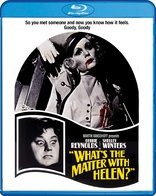
Movie rating
6.5 | / 10 |
Blu-ray rating
| Users | 0.0 | |
| Reviewer | 3.0 | |
| Overall | 3.0 |
Overview
What's the Matter with Helen? (1971)
The Midwestern mothers of two Leopold and Loeb--like murderers move to Hollywood, California in the 1930s and open a dancing school for would-be Shirley Temples seeking to break into the movies. Adelle falls in love with a Texas millionaire, but Helen turns to an evangelist and gradually goes off the deep end. Soon corpses of all kinds start piling up...
Starring: Debbie Reynolds, Shelley Winters, Dennis Weaver, Micheál MacLiammóir, Agnes MooreheadDirector: Curtis Harrington
| Horror | Uncertain |
| Musical | Uncertain |
| Thriller | Uncertain |
| Crime | Uncertain |
| Drama | Uncertain |
| Mystery | Uncertain |
Specifications
Video
Video codec: MPEG-4 AVC
Video resolution: 1080p
Aspect ratio: 1.85:1
Original aspect ratio: 1.85:1
Audio
English: DTS-HD Master Audio Mono (48kHz, 24-bit)
BDInfo
Subtitles
English SDH
Discs
Blu-ray Disc
Single disc (1 BD)
Playback
Region A (locked)
Review
Rating summary
| Movie | 3.0 | |
| Video | 3.5 | |
| Audio | 3.5 | |
| Extras | 1.0 | |
| Overall | 3.0 |
What's the Matter with Helen? Blu-ray Movie Review
Reviewed by Dr. Stephen Larson July 31, 2017During the sixties, screenwriter Henry Farrell penned two of the most chilling macabre thrillers of the decade: What Ever Happened to Baby Jane? (1962) and
Hush...Hush, Sweet Charlotte (1964), both shot in haunting black and white. Several years later, Farrell returned to the genre when he
wrote a story titled The Box Step which, according to the Los Angeles Times, was optioned by producers at United Artists. Curtis
Harrington came in to direct with the working title changed to The Best of Friends. However, Otto Preminger had already registered the
similar title of Such Good Friends and stipulated to the MPAA that Farrell's title be altered. Producer George Edwards and star Debbie
Reynolds (also an uncredited producer) incurred legal fees to keep The Best of Friends but to avoid a longer battle, eventually acquiesced to
Preminger's demand and changed the title to What's the Matter with Helen?. When the movie opened, Jean Dietrich of The Courier-
Journal headlined it as a sequel to Baby Jane and Sweet Charlotte. Several other critics also compared it to the other two films.
Taken on its own, What's the Matter with Helen? is a pretty fine musical comedy/horror thriller hybrid but when considered with its
predecessors, it's the lesser of the three films.
The movie starts rather ingeniously with a black-and-white image of the Hearst Metrotone News image before seguing into a March of Time-like
compilation of newsreel clips, which show FDR delivering a speech and First Lady Eleanor boarding for an over-ocean flight. These images provide
the time markers for the pseudo-documentary clips of a murder trial in Iowa. Two male teenagers are convicted of killing a young lady and the
killers' mothers, Adelle Bruckner (Debbie Reynolds) and Helen Hill (Shelley Winters), are mobbed by the throng of press photographers. Bruckner
and Hill receive a threatening telephone call from a man who claims he was close to the victim. Feeling that a change of scene is necessary, the two
women travel to Hollywood in 1934 to start a talent academy for very young actresses aspiring to break into the movies (the actual production
attracted auditions from 200 Shirley Temple look-alikes). Both ladies have changed their surnames: they are now known as Adelle Stuart and Helen
Martin. Helen performs the songs amateurishly on piano while Adelle more adroitly teaches the moppets basic dance and tap-dancing moves. Adelle
hires Hamilton Starr (Micheál MacLiammóir, channeling Sydney Greenstreet) as an elocution instructor in spite of Helen's qualms. The platinum
blonde Adelle, apparently modeling her appearance after Jean Harlow, wants to look glitzy and glamorous to gentlemen visitors. She strikes up a
relationship with Linc Palmer (Dennis Weaver), a Texas millionaire and father to one of the girls (Samee Lee Jones) in the talent school. Helen is far
more insecure and less sure of herself. Similarly indecent phone calls from supposedly the same anonymous caller ring in and Helen experiences
recurring visions of her childhood when the blades of a mule-drawn plough slice up her father on the family farm. Helen becomes an avid Bible
reader and listens to the evangelist Sister Alma (Agnes Moorehead, portraying a likeness of Aimee Semple McPherson), on the radio. Helen attends
the Church of the Open Hand where she confronts Sister Alma during a church offering service. Helen makes a spectacle out of herself and because
she's been so disruptive, Alma refuses to grant her the assurance of God's forgiveness over past sins.
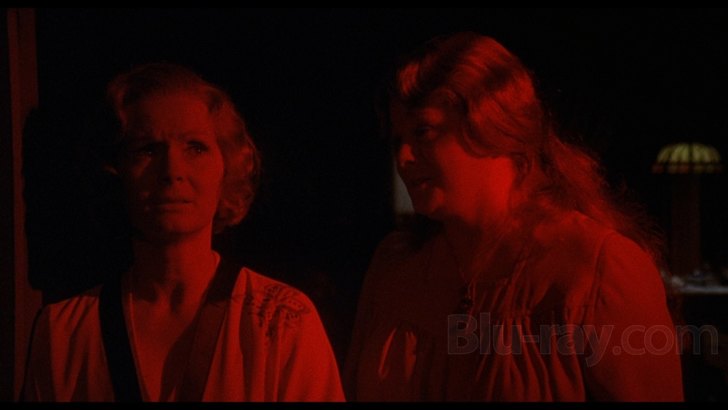
Adelle and Helen dream of going to Tinseltown.
Reynolds and Winters play off each other well. Given that she had done a lot of dancing in film before, Reynolds was a natural to teach her pupils the tap terpsichore to the tune of "Stars and Stripes Forever," for instance. Winters had played a wide variety of characters and employed her Method training to give Helen an almost bipolar temperament. Helen has a collection of white rabbits because, I think, they symbolize the purity and innocence of her youth before her dad's accident. But as much as she tries to suppress her memories, Helen can assume another personality that makes her inclined to launching into violent outbursts. Reynolds and Winters counterbalance the other's different behavioral attributes but Winters acts over-the-top to the point where the material becomes more pure camp than kitsch. The screen duo work relatively well together but they don't create as many memorable scenes as Bette Davis and Joan Crawford do in Baby Jane or Davis and Olivia de Havilland in Sweet Charlotte.
*NOTE: What's the Matter with Helen? was originally rated GP (general audiences admitted) by the MPAA. This occurred after footage that overtly revealed Helen as a lesbian was cut (Winters really tried to play up this aspect of her character.) Additionally, there were also some graphic shots excised of one of the murder scenes. Unfortunately, the deleted scenes and outtakes apparently don't exist anywhere and hence haven't been reinstated on this BD. However, the studio that sent a digital intermediate to Shout! re-rated the movie an "R" after it recently submitted the picture to the MPAA. Interestingly, a critic who gave Helen a very favorable review in 1971 felt that the film was too disturbing (even in its toned- down state) to warrant only a GP, which he deemed too lenient for subject matter of this nature.
What's the Matter with Helen? Blu-ray Movie, Video Quality 
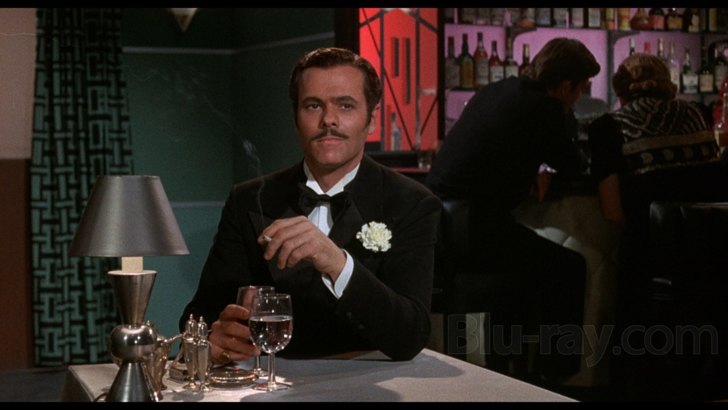
What's the Matter with Helen? makes it Blu-ray debut worldwide courtesy of Shout! Factory on this MPEG-4 AVC-encoded BD-25. The main
feature has been given a standard video bitrate of 25494 kbps, with the whole disc boasting a total bitrate of 28.90 Mbps. Shout! advertises this scan
as a "new high-definition transfer from the interpositive," Jeff Nelson, Senior Marketing Director for Scream Factory, posted on social media that "our
budget was spent on the all-new film transfer--making it look the best it could be."
What did What's the Matter with Helen? look like on the theatrical release prints? Charles Higham described the film's visual design and
art/set decoration in his Film Quarterly review: "an Art Deco, black-and-silver gambling ship and its tango band, a Spanish-style house and an
ambience of night streets; Lucien Ballard's photography has a subdued, lacquered elegance." Jim Montgomery of The Shreveport Times also
made some observations: "Colors that somehow convey a lush tackiness and filming it all in muted, rich lighting...subdued hollow garishness."
This transfer by Shout! does a pretty good job of recapturing the film's original appearance. It can look overly bright which accents print defects and
other visual anomalies. The image has not been completely cleaned up and viewers will notice markings throughout. There are some soiled stains on
the print, which can be seen on the white wall as Reynolds's character goes behind the curtain in Screenshot #18. The film looks best during the
dance rehearsal and performance scenes, which showcase the brighter colors (see #s 9-11).
Shout! has divided the feature up into a dozen chapter breaks.
What's the Matter with Helen? Blu-ray Movie, Audio Quality 
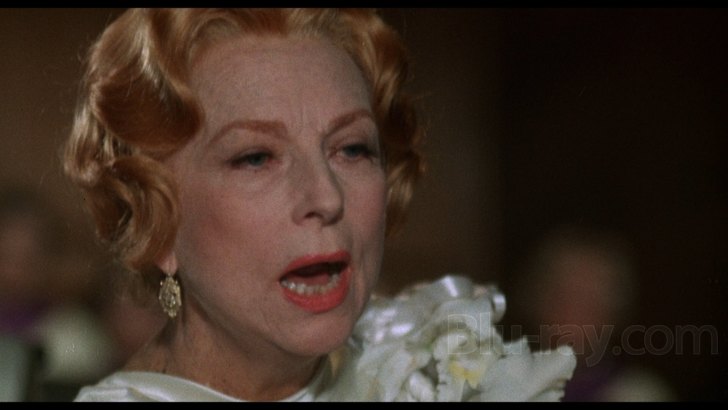
What's the Matter with Helen? comes with its original monaural sound track, rendered here as a DTS-HD Master Audio 2.0 Dual Mono (1827
kbps, 24-bit). There is some analog hiss but no major pops and crackles that mar the track. There are no major problems in being able to hear
dialogue. David Raksin's original score and the song-and-dance numbers are the greatest beneficiaries on the front speakers, with music sounding
warm and vibrant.
Shout! supplies optional English SDH for the movie.
What's the Matter with Helen? Blu-ray Movie, Special Features and Extras 
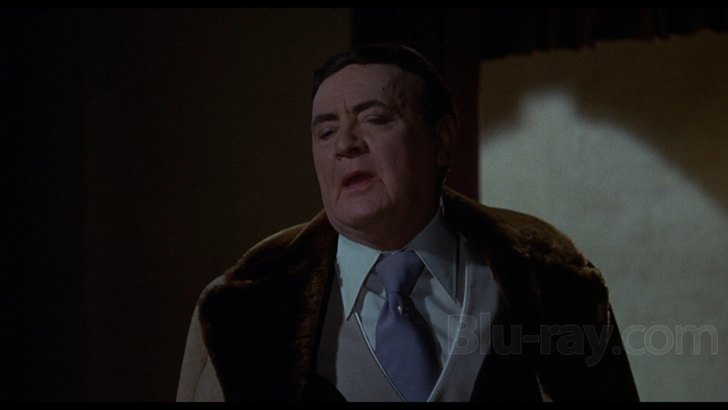
- Original Theatrical Trailer (2:10, 1080p) - a 1.85:1 anamorphic widescreen trailer that while color-corrected, contains thin scratches and tramlines. In English, not subtitled.
- Original Radio Spot (1:00) - a good-quality radio spot advertising What's the Matter with Helen. In English, not subtitled.
- Still Gallery (3:24, 1080p) - the first images comprise eighteen black-and-white photos from United Artist's publicity campaign, followed by four color stills. The last fifteen consist of lobby cards, theatrical release posters, and industry trade ads that promote What's the Matter with Helen.
What's the Matter with Helen? Blu-ray Movie, Overall Score and Recommendation 
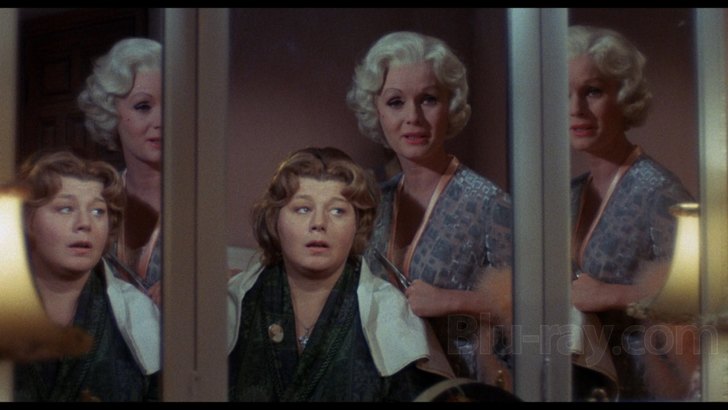
What's the Matter with Helen? is Baby Jane and Sweet Charlotte lite but judged on its own merits, it's pretty good Grand Guignol. Shout! Factory didn't undertake major restorative work on the film's interpositive but the high resolution on the Blu-ray make the primary colors stand out well. The lossless audio is solid but extras are on the skimpy side. The BD is RECOMMENDED to fans and completists of Reynolds and Winters's screen work.
Similar titles
Similar titles you might also like

The Other
Limited Edition to 3000 - SOLD OUT
1972

Brahms: The Boy II
2020

Marrowbone
The Secret of Marrowbone
2017

The Wicker Man
The Final Cut
1973

Stonehearst Asylum
Eliza Graves
2014

Endless Night
1972

The Evictors
1979

The Skeleton Key
2005

The Climax
1944

The Others
2001

The Seventh Victim 4K
1943

A Cure for Wellness
2016

Hemlock Grove: The Complete First Season
2013

The Outsider: The Complete First Season
2020

Regression
2015

Influencer
Slipcover in Original Pressing
2023

Monstrous
2022

Don't Worry Darling
2022

Depraved
2019

The Little Stranger
2018